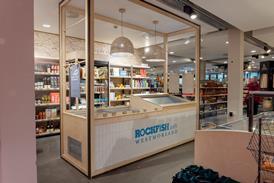Close menu
- Home
- Buying & Supplying
- Stores
- Channels
- Finance
- People
- Reports
-
Events
- Back to parent navigation item
- Events
- The Grocer Gold Awards
- LIVE: Retail Week x The Grocer
- The Grocer New Product & Packaging Awards
- The Convenience Awards
- The Convenience Conference
- Rethinking Materials
- Food & Drink Expo
- Farm Shop & Deli Product Awards
- Farm Shop & Deli Retailer Awards
- The Omnichannel Conference
- Jobs
- Subscribe now
- Previous slide
- 1 of 1
- Next slide
| Category | Total sales | % change |
|---|---|---|
| Ready To Drink (RTD) | 55.4 | 1.3 |
| Isotonic | 41.2 | -7.6 |
| Powdered Drinks | 18.1 | 17.3 |
| Bar | 16.7 | 86.2 |
| Supplement | 14.2 | 40.9 |
| Flapjack | 8.8 | 53.2 |
| Tablet | 5.9 | 25.2 |
| Capsule | 0.9 | -9.6 |
| Gel | 1.5 | 4.1 |
| Other Formats | 3.2 | 249.1 |
- The sports and energy category has had a solid year, growing 2.5% (vs 1.7% total grocery) driven by more shoppers buying into the category (penetration is up from 37.9% to 39.2%). The big focus has been gearing up for the impending sugar levy by pushing existing zero-sugar/diet ranges, product reformulations and new low-sugar launches.
- The sports nutrition market has seen strong growth, up 19% in value in the latest MAT, in line with the increasingly health-conscious focus of consumers and brands, particularly the trend towards protein. Food nutrition snacks have particularly flourished, with bars growing by £7.7m and flapjacks by £3m. Unlike in the competitive sports and energy category, where prices have stayed deflationary, higher prices have been an avenue for growth in sports nutrition, up 10.9%.
- Following the trend within total grocery; the sports and energy category has moved away from volume promotions towards price cuts and EDLP.
- Prices have risen within sports nutrition. Price competition is arguably lower in a growing category and consumers are willing to pay more for health benefits such as protein.
- Brands continue to dominate sports & energy, with 90% value share of the market. Within energy, both brands and private label have grown and with sports both brands and private label have declined.
- Likewise in sports nutrition, brands own the sector, with a 92% share. Own label is yet to offer a viable alternative to the specialist branded products.
- As sports nutrition becomes more mainstream, existing brands are growing ranges to push for more shelf space, and new entrants to the market are common. Pulsin is a new entrant, while Graze has also jumped on to the protein wave with a flapjack and bites.
- Lucozade has grown by £10m, underpinned by the performance of Lucozade Energy and the successful launch of Zero. Red Bull has also grown 12%, bucking the trend by growing through its full-sugar offerings. Own label only has 13% share of sales and growth is much more moderate at 1.5%, but Lidl's own label Freeway Up offering has been successful, growing £2m.
- In Sports Nutrition, Trek continues to lead the sector, underpinned by the success of its flapjacks. Bounce protein balls have become more established, now at £1.7m. Retailers could look to start to address the limited own label presence within sports nutrition, as Asda has started to do.
- Supplements continue to go from strength to strength. On the back of the protein health trend, protein-oriented supplements have particularly flourished. Expect more protein launches with supplements, as well as suppliers within wider food and drink shouting about the protein content of their offerings.
Kantar Worldpanel analyst comments


